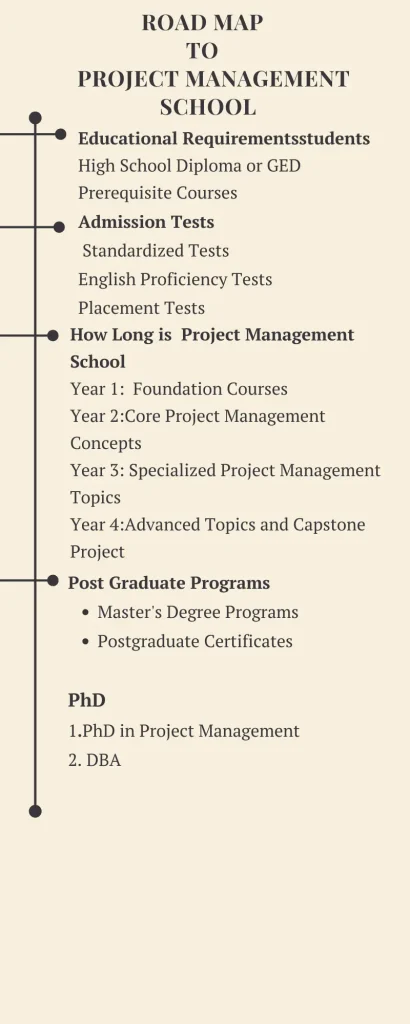How Long is Project Management School
The duration of project management school varies based on the program and level of study. Certificate programs can take a few months, while bachelor’s degrees typically take four years. For a master’s degree, expect to spend one to two years. So, how long is project management school? It depends on your educational goals.
What is Project Management School
Project management school is an educational institution or program focused on teaching students the principles and practices of managing projects. These schools offer various programs, including certificates, bachelor’s, and master’s degrees, aimed at equipping students with the necessary skills to plan, execute, and oversee projects efficiently. Coursework often covers topics such as project planning, risk management, budgeting, and leadership.

In addition to theoretical knowledge, project management school emphasizes practical experience. Students engage in real-world projects, case studies, and internships to apply their learning in practical settings. This hands-on approach ensures that graduates are well-prepared to handle the complexities of project management in diverse industries, from construction and engineering to IT and healthcare.
How Long is Project Management School
Year 1: Foundation Courses
In the first year, students focus on foundational courses that introduce the basics of project management and general business principles. Key subjects may include:
Introduction to Project Management
Principles of Management
Business Communication
Fundamentals of Accounting
Microeconomics and Macroeconomics
Year 2: Core Project Management Concepts
The second year delves deeper into core project management concepts and techniques. Students typically study:
Project Planning and Scheduling
Risk Management
Cost Estimation and Budgeting
Project Procurement Management
Organizational Behavior
Year 3: Specialized Project Management Topics
In the third year, students begin to explore specialized topics within project management and gain practical experience through projects and internships. Courses often include:
Project Quality Management
Agile Project Management
Information Technology Project Management
Leadership and Team Building
Internship/Practical Project Experience
Year 4: Advanced Topics and Capstone Project
The final year focuses on advanced project management topics and the completion of a capstone project. This year includes:
Strategic Project Management
Advanced Project Management Tools and Techniques
Ethics and Professional Responsibility
Electives in areas such as Construction Management, Healthcare Project Management, or IT Project Management
Capstone Project, where students apply their knowledge to a real-world project, demonstrating their proficiency in managing all aspects of a project from initiation to closure
Graduates of the undergraduate program in project management are well-prepared for entry-level positions in various industries, equipped with a comprehensive understanding of project management principles and practical experience.

How to Enter Project Management School
Educational Requirements
High School Diploma or Equivalent: Applicants must have completed high school or possess an equivalent qualification such as a GED.
Prerequisite Courses: Some programs may require completion of specific courses in mathematics, English, and business.
Minimum GPA: A minimum GPA, often around 2.5 to 3.0, may be required for admission.
Entry Tests
Standardized Tests: Depending on the school, applicants may need to submit scores from standardized tests such as the SAT or ACT.
English Proficiency Tests: For international students, tests like TOEFL or IELTS may be required to demonstrate proficiency in English.
Placement Tests: Some schools might require placement tests in subjects like math and English to determine appropriate course levels.
Application Process
- Research Programs: Identify project management programs that align with your career goals and educational background.
- Submit Application: Complete and submit the application form through the school’s online portal or via mail.
- Transcripts: Provide official high school transcripts or equivalent documentation.
- Test Scores: Submit standardized test scores, if required.
- Personal Statement: Write a personal statement or essay explaining your interest in project management and career aspirations.
- Letters of Recommendation: Obtain letters of recommendation from teachers, counselors, or professionals who can attest to your qualifications and character.
- Application Fee: Pay the application fee, which varies by institution.
Financial Aids
Scholarships: Merit-based scholarships awarded based on academic performance, leadership qualities, and extracurricular involvement.
Grants: Need-based grants provided by the federal government, state governments, or the institution itself.
Student Loans: Federal and private loans available to cover tuition and other educational expenses, to be repaid after graduation.
Work-Study Programs: Part-time employment opportunities provided by the school to help students earn money to pay for their education.
Tuition Reimbursement: Some employers offer tuition reimbursement programs for employees pursuing relevant degrees.
Financial Aid Application: Complete the Free Application for Federal Student Aid (FAFSA) to determine eligibility for federal aid.
These components are crucial for navigating the process of entering and financing your education in a project management school.
Post Graduate and PhD Programs for Project Management School
Post Graduate Programs
Master’s Degree in Project Management
Program Duration: Typically 1-2 years.
Curriculum:
Core Courses:
Advanced Project Management
Project Risk Management
Project Quality Management
Financial Management for Projects
Electives:
Agile Project Management
Program and Portfolio Management
Information Systems Project Management
Capstone Project: An extensive project that applies theoretical knowledge to a real-world scenario.
Prerequisites:
Bachelor’s degree in a related field.
Professional experience may be required by some programs.
Outcomes:
Advanced skills in managing complex projects.
Preparation for senior project management roles or consultancy positions.
Eligibility for certifications like PMP (Project Management Professional).
Postgraduate Diploma/Certificate in Project Management
Program Duration: Typically 6 months to 1 year.
Curriculum:
Core project management principles.
Practical skills in project planning, execution, and control.
Focus on specific industries, such as construction, IT, or healthcare.
Prerequisites:
Bachelor’s degree or equivalent professional experience.
Outcomes:
Enhanced project management skills for career advancement.
Shorter duration compared to a master’s degree, ideal for working professionals.
PhD Programs
PhD in Project Management
Program Duration: Typically 3-5 years.
Curriculum:
Core Courses:
Advanced Project Management Theories
Research Methods and Design
Quantitative and Qualitative Analysis
Research:
Extensive research leading to a dissertation.
Contribution to the academic and practical knowledge base of project management.
Specializations:
Strategic Project Management
Innovation and Technology Management
Project Governance and Control
Prerequisites:
Master’s degree in project management or a related field.
Strong academic and research background.
Outcomes:
Expertise in project management research and theory.
Preparation for academic, research, and high-level consultancy roles.
Contribution to scholarly literature and practical advancements in the field.
Doctor of Business Administration (DBA) with a Focus on Project Management
Program Duration: Typically 3-4 years.
Curriculum:
Emphasis on applying research to real-world business problems.
Combination of coursework and applied research projects.
Prerequisites:
Master’s degree in business or a related field.
Significant professional experience.
Outcomes:
Advanced leadership and strategic management skills.
Preparation for senior executive roles and thought leadership in project management.
Top 10 Project Management Schools

1. Stanford University
Location: Stanford, California, USA
Program: Master’s in Management Science and Engineering
Highlights: Emphasis on engineering, management, and data analytics. Strong industry connections and internship opportunities.
2. Massachusetts Institute of Technology (MIT)
Location: Cambridge, Massachusetts, USA
Program: Master’s in Engineering and Management
Highlights: Collaboration between the MIT School of Engineering and the Sloan School of Management. Focus on technical and leadership skills.
3. University of California, Berkeley
Location: Berkeley, California, USA
Program: Master’s in Project Management
Highlights: Comprehensive curriculum covering all aspects of project management. Emphasis on innovation and sustainability.
4. Harvard University
Location: Cambridge, Massachusetts, USA
Program: Master’s in Project Management (Extension School)
Highlights: Flexible learning options with online and on-campus courses. Strong focus on leadership and strategic management.
5. University of Oxford
Location: Oxford, England, UK
Program: MSc in Major Programme Management
Highlights: Focus on managing large-scale projects. Integration of theory and practical application.
6. The George Washington University
Location: Washington, D.C., USA
Program: Master’s in Project Management
Highlights: Located in the heart of the US capital, offering extensive networking opportunities. Strong emphasis on policy and governance.
7. University of Manchester
Location: Manchester, England, UK
Program: MSc in Management of Projects
Highlights: Diverse curriculum covering various industries. Strong research focus and industry partnerships.
8. Columbia University
Location: New York, New York, USA
Program: Master’s in Construction Administration (Project Management Focus)
Highlights: Integration of construction management and project management. Located in a major business hub.
9. Purdue University
Location: West Lafayette, Indiana, USA
Program: Master’s in Project Management
Highlights: Emphasis on technical project management skills. Strong engineering and business integration.
10. University of Texas at Austin
Location: Austin, Texas, USA
Program: Master’s in Project Management
Highlights: Comprehensive curriculum with a strong focus on practical application. Collaboration with industry leaders.
Factors Affecting the Length of Project Management School
1. Type of Program
Certificate Programs: Typically the shortest, ranging from a few weeks to several months.
Bachelor’s Degree Programs: Usually take four years to complete.
Master’s Degree Programs: Generally require 1-2 years of full-time study.
PhD Programs: Often take 3-5 years, depending on the research topic and dissertation requirements.
2. Mode of Study
Full-Time vs. Part-Time: Full-time students complete programs faster than part-time students, who may take several additional years.
Online vs. On-Campus: Online programs might offer accelerated options, while on-campus programs follow a traditional academic calendar.
3. Prior Educational Background
Relevant Degrees: Students with prior relevant degrees or coursework might complete programs faster due to transfer credits or exemptions.
Work Experience: Some programs offer credit for professional experience, potentially shortening the duration.
4. Curriculum Structure
Number of Required Credits: Programs with more required credits take longer to complete.
Course Load per Semester: The number of courses taken each semester affects the overall duration. Heavier course loads lead to faster completion.
Internships and Practicums: Required practical experiences can extend the length of the program if they are not integrated into the regular coursework.
5. Institutional Policies
Program Flexibility: Schools with flexible scheduling options, such as accelerated courses or summer sessions, can shorten the duration.
Thesis or Capstone Project: Programs requiring a thesis or capstone project might take longer due to the time needed for research and project completion.
Final Verdict
The length of project management school varies significantly based on the type of program, mode of study, prior education, and personal circumstances. Understanding these factors helps prospective students make informed decisions about their educational paths and career goals in project management.
FAQs
1. How long does a bachelor’s degree in project management take?
A bachelor’s degree in project management typically takes four years of full-time study to complete.
2. Can work experience shorten the duration of project management programs?
Yes, some programs offer credit for relevant professional experience, potentially reducing the time needed to complete the program.
3. Are online project management programs shorter than on-campus ones?
Online programs often offer accelerated options that can be completed faster than traditional on-campus programs.
4. What factors can extend the length of project management school?
Factors include part-time enrollment, additional prerequisite courses, personal commitments, and the availability of required courses.
5. Do project management schools offer financial aid?
Yes, many project management schools offer financial aid options such as scholarships, grants, loans, and work-study programs to help students finance their education.
